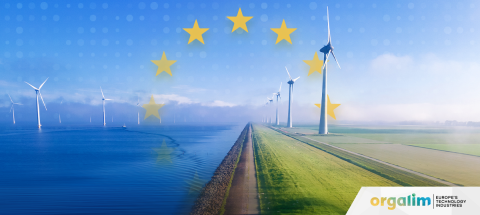Shaping Europe's Climate Future: Embracing Opportunities and Addressing Challenges
8 February 2024
Europe stands at a pivotal moment in its climate agenda as the European Commission unveiled its Communication on Europe's climate 2040 target. This landmark proposal advocates for a 90% reduction in carbon emissions compared to 1990 levels, aiming to propel the continent towards climate neutrality by 2050. Amidst mounting climate crises and shifting geopolitical dynamics, Europe faces multifaceted challenges and unprecedented opportunities in charting its sustainable course.

To gain insights into the opportunities, challenges, and transformative potential of Europe's climate agenda, we spoke with three key stakeholders: Manon Dufour, Executive Director at E3G Brussels; Henrique Laitenberger, Chair of the Orgalim Energy Resilience Task Force and Head of EU Affairs for Technology Industries of Finland; and Daniel Wennick, Orgalim Policy Director.
Aligning 2040 Climate Targets with Global Dynamics
In light of Europe's climate journey, Dufour stresses the urgency of aligning the continent's climate targets with global dynamics. Climate-related disasters are escalating, impacting Europe's socio-economic fabric and ecosystems profoundly. "The past few years have further strengthened the case for continued and ambitious climate action in the EU and globally. Climate-related disasters are becoming too frequent and too severe to discount, with far-reaching impacts on Europe's socio-economic fabric and ecosystems," Dufour commented.
Climate-related disasters are becoming too frequent and too severe to discount, with far-reaching impacts on Europe's socio-economic fabric and ecosystems.
The war in Ukraine has accelerated the clean energy transition, framing it as a security issue, and competitive pressures from global powers like the US and China underscore the need for an EU green industrial policy.
Carbon pricing is another important concern, adds Wennick. Although the EU has implemented carbon pricing, it only applies to 20 percent of global emissions. This not only underscores the disparity between global inaction and EU efforts in addressing climate change but also poses a competitive disadvantage for EU businesses.
Last year's COP28 was a platform for the EU to demonstrate its leadership in climate action, using its global influence to drive significant change. As Europe announces its 2040 climate target, the importance of this milestone cannot be overstated. It not only marks progress towards achieving climate neutrality by 2050 but also strengthens Europe's ability to withstand the impacts of climate change and price fluctuations.
Opportunities and Challenges for the New Commission
The EU recommendation for the 2040 climate target coincides with the rise of the extreme right in European politics, casting a shadow on its ability to deliver these ambitious climate policies. Whilst there is broad support within the EU for the new 90% target, deliberations on its achievement may take a radical turn after the European Parliament elections in June.
Wennick highlights a primary challenge for the new Commission: maintaining faith in the current energy and climate frameworks cost-efficient delivery. The EU's climate policy architecture, including the EU Emissions Trading System (ETS), must avoid bureaucratic hurdles to prevent resistance from various political groups.
One of the main challenges for the new commission will be to have faith in the current energy and climate framework.
It is too early to say, comments Dufour. European governments and leaders will need to reflect on the proposals issued and provide strategic guidance to the new Commission that will decide on a legislative proposal.
Role of Technology Industries in Achieving Climate Objectives
As the world moves towards meeting the recommended 2040 climate target, industries are set to undergo profound transformations. Clean energy demand will drive electrification, the shift to non-fossil fuels, the implementation of new technological processes and circular economy actions.
In this evolving landscape, Europe's technology industries emerge as frontrunners in the journey towards climate neutrality. According to Laitenberger, these industries are fully committed to the cause and have already taken substantial steps to modernise production methods, invest in cutting-edge technologies, and align their business models with a net-zero future. However, Laitenberger stresses the crucial need for political backing to expedite these efforts effectively.
Europe's technology industries are fully committed to climate neutrality and have already been making active efforts to make their business models ready for net zero.
Dufour, Wennick, and Laitenberger all emphasise the expanding role of industries in developing and deploying sustainable products within the climate discourse. They stress the significance of technology and innovation in driving solutions for the net-zero transition, underscoring its ability to streamline energy and material usage while enhancing product performance.
Industry stands poised to deliver the required technological solutions for the net-zero transition. However, as Wennick stresses, policymakers' support is key notably to streamline processes, foster a robust single market, enhance trade relations with key partners, reduce regulatory burdens, and ensure a conducive investment climate. These measures are essential for enabling industry to accelerate progress towards climate goals.
Priorities for Supporting Europe's Technology Industries Competitiveness

As we embark on the journey towards climate neutrality, it's crucial to build a robust economy while maintaining industry competitiveness. With global clean energy transitions advancing, the demand for zero-emission technologies and sustainable products will surge, intensifying competition and fostering innovation across sectors.
Discussing the priorities for Europe's technology industries' competitiveness, Laitenberger highlights the need for streamlined regulations and increased investment in research and innovation. These steps are essential to position Europe at the forefront of clean technology development.
Wennick complements this perspective by advocating for a combined focus on climate leadership and innovation. He suggests integrating enabling technologies into the EU Taxonomy and broadening the scope of publicly financed innovation programs. Wennick also emphasises the importance of technology neutrality and market-driven solutions to drive competitiveness.
Laitenberger further underscores the significance of supporting the deployment of clean energy and digital infrastructure. He highlights that these efforts are crucial for companies to leverage technological opportunities effectively within their sectors. In alignment, Wennick emphasises the importance of continuing to follow the current energy and climate framework, emphasising market-driven policy tools like the EU ETS to ensure a cost-efficient net-zero transformation.
As Europe stands at a critical juncture in its climate trajectory, bold action, collaborative effort, and unwavering commitment are imperative to secure a sustainable future for generations to come. The recommendations and insights provided by key stakeholders offer valuable guidance in navigating the complexities of Europe’s climate agenda and charting a transformative path towards sustainability and resilience.
Read Orgalim's position and recommendations on the 2040 Climate Target for the European Union here.